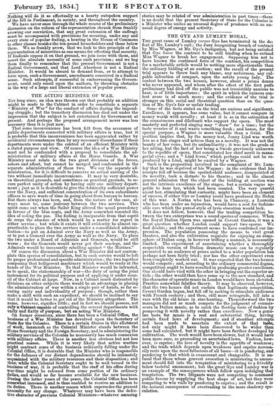THE ACTING MINISTER OF WAR.
NOT long since, an idea was thrown out that probably an addition might be made to the Cabinet in order to constitute a separate "Ministry of War" for the conduct of affairs during the impend- ing struggle • but the transitory discussion has died out under the impression that the subject is not entertained by Government at present. And perhaps the proposed arrangement never was less necessary than it is just now. That some inconvenience has been felt from the severance of public departments connected with military affairs is true, but it is probable that this inconvenience has been aggravated rather by accidental circumstances than by any necessary discordance if these departments were under the control of an efficient Ministry with a stated purpose and view. Of course the idea of a War Ministry must not be confounded with a proposal to consolidate the ad- ministration of military affairs at the Horse Guards. A War Ministry must relate to the two great divisions of the forces, ashore and afloat, but cannot be merged and confounded in the separate administration of those two. We say the separate ad- ministration, for it is difficult to conceive an actual uniting of the two without immediate inconvenience. It may be very desirable, on theoretical grounds, and sometimes on practical grounds, to se- cure perfect unity of action by having only one military depart- ment ; just as it is desirable to give the Admiralty sufficient power over the Navy, and sufficient concentration of its own subordinate officers to save waste of time in going about from bureau to bureau. But there always has been, and, from the nature of the case, al- ways must be, some jealousy between the two services. This spirit came out when the Sailor King altered the usual precedency in favour of the blue coats, and the Army somewhat resented the idea of ceding the pas. The feeling is inseparable from that esprit de corps the absence of which would be a matter for regret in either service ; but while it exists it will evidently be almost im- practicable to place the two services under a consolidated adminis- tration—to put an Admiral over the Navy as well as the Army, or to put a General over the Army as well as the Navy. To place the two under a Board of Admirals and Generals, would be still worse ; for the Generals would never get their sea-legs, and the Admirals would be incessantly rebelling against " the Marines."
Of course the discussion about a War Minister did not contem- plate this species of consolidation, but to each service would be left its proper professional and specific administration ; the two together composing that belligerent machinery which would be ready at the hands of the War Minister. To that Minister would be intrusted, so to speak, the statesmanship of war—the duty of using the joint instrument for its political purpose and of applying it under coun- cil of the Cabinet at large. Now, in a Cabinet much distracted by divisions on other subjects there would be an advantage in placing the administration of war within a single pair of bands, so far se- curing unity and individuality of purpose ; though, rather than make a shift with such an expedient, we should be inclined to say that it would be better to get rid of the Ministry altogether. The name, however, signifies little ; and in fact we should possess, not only a Cabinet capable of controlling the several departments with unity and fixity of purpose, but an acting War Minister.
On former occasions, since there has been a Colonial Office, the business of a War Minister has devolved upon the Secretary of State for the Colonies. There is a certain fitness in this allotment of work, inasmuch as the Colonial Minister stands between the Home Secretary and the Foreign Secretary, and in administering the military services of the Colonies he necessarily has much connexion with military affairs. There is another less obvious but not less practical reason. While it is very likely that active warfare might contract some of the business ordinarily falling under the Colonial Office, it is desirable that the Minister who is responsible for the defences of our distant dependencies should be intimately acquainted with the military resources and their disposition; and thus, while the Colonial Secretary ought to be well versed in the business of war, it is probable that the staff of his office during war-time might be released from some portion of its ordinary duties, and would so far become available for the new business. During the latter years of the peace, the Colonial Office has been somewhat increased, and is thus enabled to receive an addition to its duties. There is another reason which supersedes the present necessity for any change. Whatever may have been the defec- tive character of previous Colonial Ministers—whatever amusing stories may be related of war administration in past times—there is no doubt that the present Secretary of State for the Colonies is a Minister who unites an unusual degree of prudence with an un- usual degree of energy and activity.


























 Previous page
Previous page